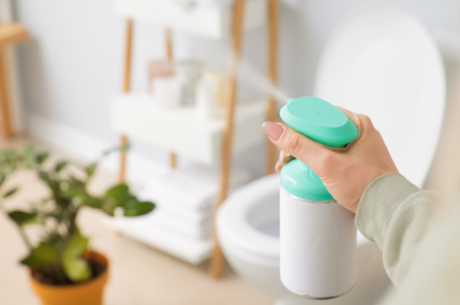Cooking at home brings warmth, flavor, and comfort to family life… but let’s be honest, some meals leave behind smells that seem to hang around far too long.
While the aroma of fresh-baked bread or cookies is delightful, not every odor is so welcome. Think garlic, onions, fish, bacon grease, or that experiment in the air fryer that got a little smoky.
For many property owners in Evanston and across Chicagoland, lingering cooking odors aren’t just a nuisance. They can also make guests uncomfortable, leave fabrics smelling stale, and even lower your indoor air quality.
If you’ve ever walked through your front door only to be reminded of last night’s dinner, this article is for you.
As a property restoration company with years of experience tackling everything from fire and smoke cleanup to mold remediation, we know a thing or two about stubborn odors. Here’s a comprehensive guide to eliminating lingering cooking smells and keeping your space smelling fresh.
Why Do Cooking Odors Linger?
Before diving into solutions, it helps to understand why some scents feel like they move in permanently.
- Oils and grease particles: When heated, they don’t just stay in the pan. They become airborne, stick to walls, cabinets, and fabrics, and continue releasing odor long after clean-up.
- Strong-smelling foods: Ingredients like garlic, cabbage, curry spices, and fish naturally contain sulfur compounds or oils that linger longer than milder foods. Interestingly, it’s often these “smelly” foods that are the best for your health.
- Poor ventilation: In older homes or apartments without efficient vents and fans, smells don’t escape easily and instead keep recirculating indoors.
- Porous surfaces: Upholstery, drapes, carpet, and even painted walls absorb odors and release them over time.
The good news? While persistent, these smells are manageable with the right strategies.
Quick Fixes for Immediate Relief
If you’ve just finished cooking and need a fast solution before guests arrive, here are some practical tricks that work in minutes:
- Open Windows and Create a Cross-Breeze
Fresh air is your best friend. Open at least two windows on opposite sides of the kitchen or living area. Position a fan near one to push odors outdoors.
- Simmer Natural Fresheners
A classic remedy is simmering a pot of water with citrus peels, cinnamon sticks, or cloves. The steam pushes pleasant fragrances into the air while neutralizing unwanted ones.
- Brew a Pot of Coffee
Coffee not only smells amazing but also helps neutralize stubborn food odors. Even leaving out a small bowl of unused coffee grounds on the counter can absorb smells. Refrigerating used coffee grounds can also help absorb funky smells from your coldbox.
- Vinegar Steam
Place a bowl of vinegar near the stove while cooking foods like fish or onions. The natural acidity helps absorb airborne particles before they settle.
- Burn Soy Candles
Unscented or lightly scented soy candles can help burn off odor particles without masking them with heavy fragrances.
Sometimes surface-level fixes aren’t enough. If these moves don’t get the job done, here’s how to proceed with tackling a more serious cooking odor problem.
Deep Cleaning for Stubborn Smells
When smells have seeped into fabrics and finishes, a targeted deep clean will make a big difference.
Degrease Surfaces
Wipe down cabinets, backsplash, and even walls with warm water and mild dish soap (or a homemade natural kitchen degreaser). Grease particles love to cling to these surfaces and keep the odor alive.
Wash Fabrics
Curtains, tablecloths, seat cushions, and throw pillows act like sponges for cooking smells. Launder them or air them outdoors on a breezy, sunny day.
Clean the Range Hood & Filters
If your kitchen has a vent hood, check its filters. Grease buildup here can recirculate odors every time you cook. Wash or replace filters regularly, and give the hood and vent a good scrubbing once a month (according to Martha Stewart).
Carpet & Upholstery Treatment
Sprinkle baking soda generously over carpets, rugs, and fabric furniture, let it sit for a few hours, then vacuum. Baking soda is a versatile and effective natural cleaner and odor neutralizer.
Long-Term Preventive Strategies
Prevention is always easier than remediation. A few small changes in your cooking habits can dramatically reduce odor buildup at home.
Cook with lids on: Covering pots and pans keeps oil and scent molecules from spreading around the room.
Use a more efficient range hood: If possible, choose a vented system that directs air outdoors rather than recirculating it inside.
Run air purifiers: Choose one with activated carbon filters, which are specifically designed to capture odors. These can make a major difference in open-concept homes. HEPA air filters can also be extremely effective in trapping particularly odoriferous particulates.
Seasonal deep cleaning: Commit to tackling fabrics, carpets, and kitchen surfaces multiple times a year. Think of it as spring cleaning, but a new edition for each season.
Fresh Kitchens, Healthier Homes
Odor control might sound cosmetic, but it actually plays a key role in creating a healthy and inviting home.
Stale air impacts more than your nose. It can affect mood, appetite, and even how clean your home feels to guests. Combine day-to-day preventive steps with occasional deep cleaning, and you’ll enjoy the benefits of a fresh-smelling home without the annoyance of stubborn cooking odors.
And remember: if you’ve tried everything and unpleasant smells still linger, it could be a sign of hidden damage or contamination that needs professional attention.
That’s when Chicagoland families trust our experienced restoration team to step in, diagnose the problem, and restore a fresh, healthy environment. Reach out to us today!



